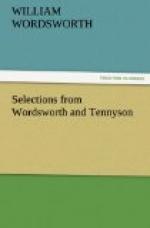“The tenderness of Tennyson is one of his remarkable qualities—not so much in itself, for other poets have been more tender—but in combination with his rough powers. We are not surprised that his rugged strength is capable of the mighty and tragic tenderness of Rispah, but we could not think at first that he could feel and realize the exquisite tenderness of Elaine. It is a wonderful thing to have so wide a tenderness, and only a great poet can possess it and use it well.”—Stopford A. Brooke.
“Tennyson is a great master of pathos; knows the very tones that go to the heart; can arrest every one of these looks of upbraiding or appeal by which human woe brings the tear into the human eye. The pathos is deep; but it is the majesty not the prostration of grief.”—Peter Bayne.
“Indeed the truth must be strongly borne in upon even the warmest admirers of Tennyson that his recluse manner of life closed to him many avenues of communication with the men and women of his day, and that, whether as a result or cause of his exclusiveness, he had but little of that restless, intellectual curiosity which constantly whets itself upon new experiences, finds significance where others see confusion, and beneath the apparently commonplace in human character reaches some harmonizing truth. Rizpah and The Grandmother show what a rich harvest he would have reaped had he cared more frequently to walk the thoroughfares of life. His finely wrought character studies are very few in number, and even the range of his types is disappointingly narrow.”—Pelham Edgar.
“No reader of Tennyson can miss the note of patriotism which he perpetually sounds. He has a deep and genuine love of country, a pride in the achievements of the past, a confidence in the greatness of the future. And this sense of patriotism almost reaches insularity of view. He looks out upon the larger world with a gentle commiseration, and surveys its un-English habits and constitution with sympathetic contempt. The patriotism of Tennyson is sober rather than glowing; it is meditative rather than enthusiastic. Occasionally indeed, his words catch fire, and the verse leaps onward with a sound of triumph, as in such a poem as The Charge of the Light Brigade or in such a glorious ballad as The Revenge. Neither of these poems is likely to perish until the glory of the nation perishes, and her deeds of a splendid chivalrous past sink into oblivion, which only shameful cowardice can bring upon her. But as a rule Tennyson’s patriotism is not a contagious and inspiring patriotism. It is meditative, philosophic, self-complacent. It rejoices in the infallibility of the English judgment, the eternal security of English institutions, the perfection of English forms of government.”—W. J. Dawson.




